Comprehensive Report on UK Company Law: Regulations and Analysis
VerifiedAdded on 2023/06/14
|15
|4182
|377
Report
AI Summary
This report provides a detailed overview of UK company law, exploring its legal framework, key features, and objectives. It discusses the incorporation of companies under common law, highlighting the roles and responsibilities of shareholders and directors, including their rights and liabilities. The report also analyzes enterprise extermination within the UK legal context, referencing relevant legislation and directives, and touches upon the impact of Brexit on UK company law and its relationship with EU regulations. Desklib offers a platform to access more solved assignments and study resources for students.

Company Law
Paraphrase This Document
Need a fresh take? Get an instant paraphrase of this document with our AI Paraphraser

Table of Contents
Introduction...............................................................................................................................................................
TASK 1......................................................................................................................................................................
TASK 2......................................................................................................................................................................
TASK 3...........................................................................................................................................................
Conclusion...............................................................................................................................................................
References...............................................................................................................................................................
Introduction...............................................................................................................................................................
TASK 1......................................................................................................................................................................
TASK 2......................................................................................................................................................................
TASK 3...........................................................................................................................................................
Conclusion...............................................................................................................................................................
References...............................................................................................................................................................
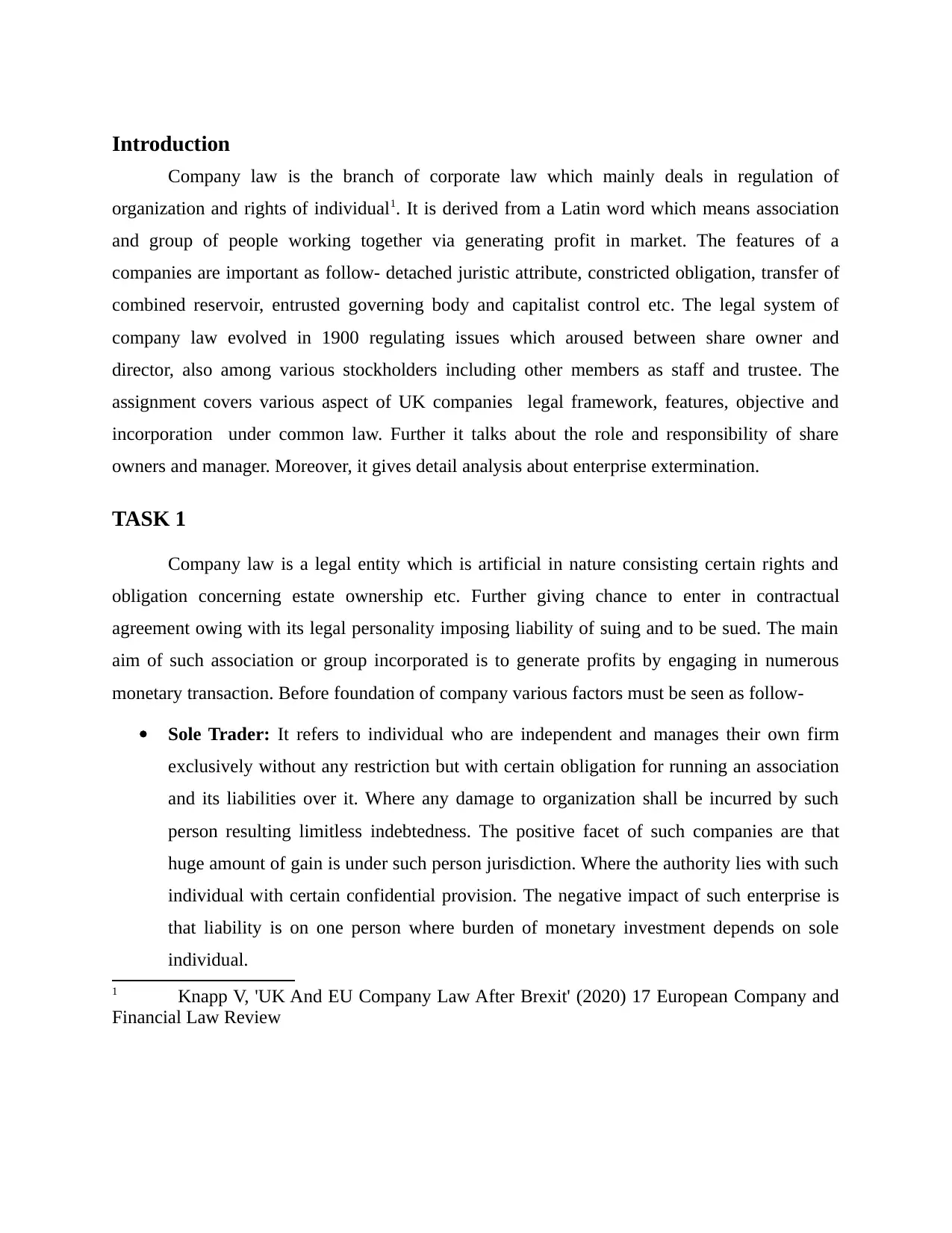
Introduction
Company law is the branch of corporate law which mainly deals in regulation of
organization and rights of individual1. It is derived from a Latin word which means association
and group of people working together via generating profit in market. The features of a
companies are important as follow- detached juristic attribute, constricted obligation, transfer of
combined reservoir, entrusted governing body and capitalist control etc. The legal system of
company law evolved in 1900 regulating issues which aroused between share owner and
director, also among various stockholders including other members as staff and trustee. The
assignment covers various aspect of UK companies legal framework, features, objective and
incorporation under common law. Further it talks about the role and responsibility of share
owners and manager. Moreover, it gives detail analysis about enterprise extermination.
TASK 1
Company law is a legal entity which is artificial in nature consisting certain rights and
obligation concerning estate ownership etc. Further giving chance to enter in contractual
agreement owing with its legal personality imposing liability of suing and to be sued. The main
aim of such association or group incorporated is to generate profits by engaging in numerous
monetary transaction. Before foundation of company various factors must be seen as follow-
Sole Trader: It refers to individual who are independent and manages their own firm
exclusively without any restriction but with certain obligation for running an association
and its liabilities over it. Where any damage to organization shall be incurred by such
person resulting limitless indebtedness. The positive facet of such companies are that
huge amount of gain is under such person jurisdiction. Where the authority lies with such
individual with certain confidential provision. The negative impact of such enterprise is
that liability is on one person where burden of monetary investment depends on sole
individual.
1 Knapp V, 'UK And EU Company Law After Brexit' (2020) 17 European Company and
Financial Law Review
Company law is the branch of corporate law which mainly deals in regulation of
organization and rights of individual1. It is derived from a Latin word which means association
and group of people working together via generating profit in market. The features of a
companies are important as follow- detached juristic attribute, constricted obligation, transfer of
combined reservoir, entrusted governing body and capitalist control etc. The legal system of
company law evolved in 1900 regulating issues which aroused between share owner and
director, also among various stockholders including other members as staff and trustee. The
assignment covers various aspect of UK companies legal framework, features, objective and
incorporation under common law. Further it talks about the role and responsibility of share
owners and manager. Moreover, it gives detail analysis about enterprise extermination.
TASK 1
Company law is a legal entity which is artificial in nature consisting certain rights and
obligation concerning estate ownership etc. Further giving chance to enter in contractual
agreement owing with its legal personality imposing liability of suing and to be sued. The main
aim of such association or group incorporated is to generate profits by engaging in numerous
monetary transaction. Before foundation of company various factors must be seen as follow-
Sole Trader: It refers to individual who are independent and manages their own firm
exclusively without any restriction but with certain obligation for running an association
and its liabilities over it. Where any damage to organization shall be incurred by such
person resulting limitless indebtedness. The positive facet of such companies are that
huge amount of gain is under such person jurisdiction. Where the authority lies with such
individual with certain confidential provision. The negative impact of such enterprise is
that liability is on one person where burden of monetary investment depends on sole
individual.
1 Knapp V, 'UK And EU Company Law After Brexit' (2020) 17 European Company and
Financial Law Review
⊘ This is a preview!⊘
Do you want full access?
Subscribe today to unlock all pages.

Trusted by 1+ million students worldwide
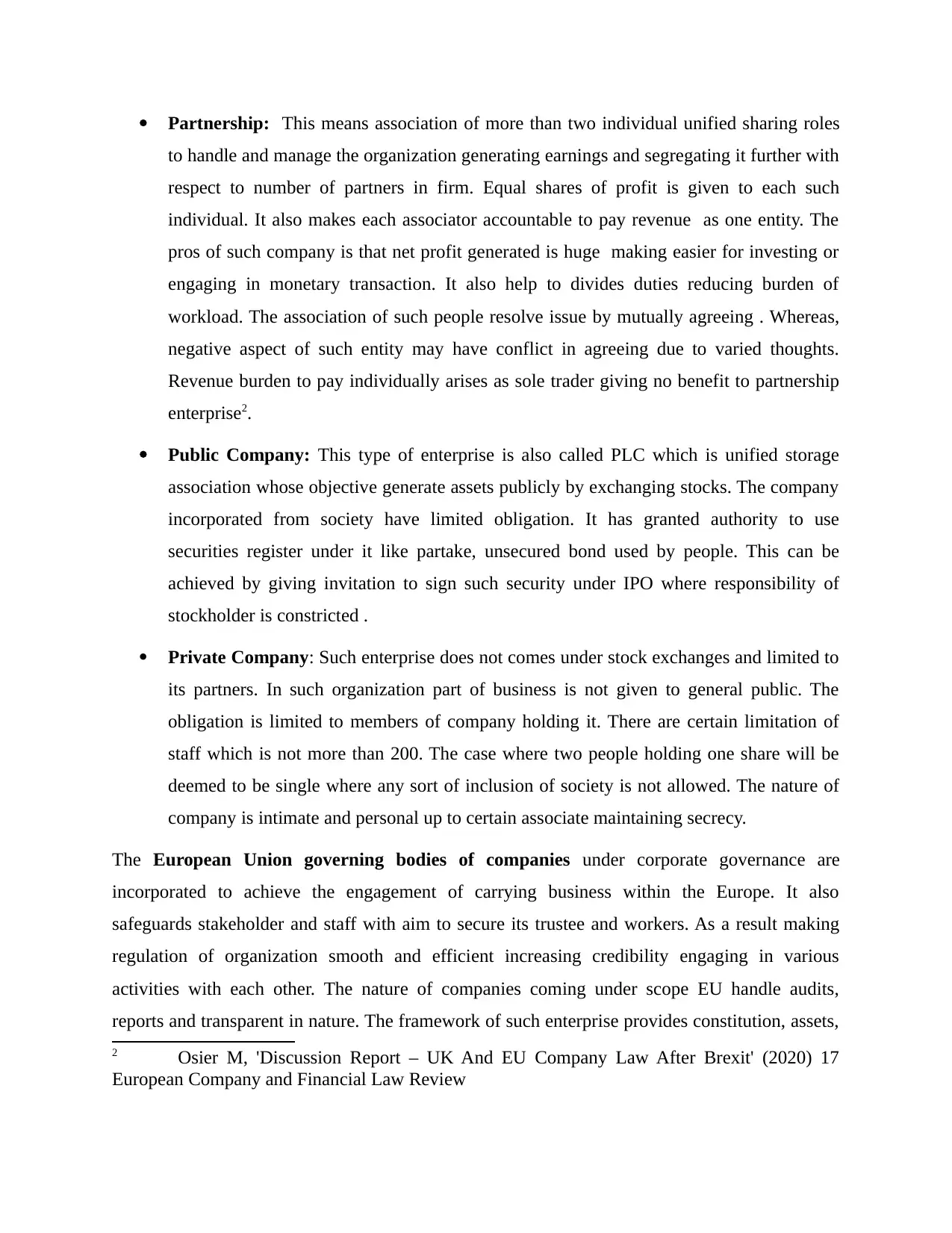
Partnership: This means association of more than two individual unified sharing roles
to handle and manage the organization generating earnings and segregating it further with
respect to number of partners in firm. Equal shares of profit is given to each such
individual. It also makes each associator accountable to pay revenue as one entity. The
pros of such company is that net profit generated is huge making easier for investing or
engaging in monetary transaction. It also help to divides duties reducing burden of
workload. The association of such people resolve issue by mutually agreeing . Whereas,
negative aspect of such entity may have conflict in agreeing due to varied thoughts.
Revenue burden to pay individually arises as sole trader giving no benefit to partnership
enterprise2.
Public Company: This type of enterprise is also called PLC which is unified storage
association whose objective generate assets publicly by exchanging stocks. The company
incorporated from society have limited obligation. It has granted authority to use
securities register under it like partake, unsecured bond used by people. This can be
achieved by giving invitation to sign such security under IPO where responsibility of
stockholder is constricted .
Private Company: Such enterprise does not comes under stock exchanges and limited to
its partners. In such organization part of business is not given to general public. The
obligation is limited to members of company holding it. There are certain limitation of
staff which is not more than 200. The case where two people holding one share will be
deemed to be single where any sort of inclusion of society is not allowed. The nature of
company is intimate and personal up to certain associate maintaining secrecy.
The European Union governing bodies of companies under corporate governance are
incorporated to achieve the engagement of carrying business within the Europe. It also
safeguards stakeholder and staff with aim to secure its trustee and workers. As a result making
regulation of organization smooth and efficient increasing credibility engaging in various
activities with each other. The nature of companies coming under scope EU handle audits,
reports and transparent in nature. The framework of such enterprise provides constitution, assets,
2 Osier M, 'Discussion Report – UK And EU Company Law After Brexit' (2020) 17
European Company and Financial Law Review
to handle and manage the organization generating earnings and segregating it further with
respect to number of partners in firm. Equal shares of profit is given to each such
individual. It also makes each associator accountable to pay revenue as one entity. The
pros of such company is that net profit generated is huge making easier for investing or
engaging in monetary transaction. It also help to divides duties reducing burden of
workload. The association of such people resolve issue by mutually agreeing . Whereas,
negative aspect of such entity may have conflict in agreeing due to varied thoughts.
Revenue burden to pay individually arises as sole trader giving no benefit to partnership
enterprise2.
Public Company: This type of enterprise is also called PLC which is unified storage
association whose objective generate assets publicly by exchanging stocks. The company
incorporated from society have limited obligation. It has granted authority to use
securities register under it like partake, unsecured bond used by people. This can be
achieved by giving invitation to sign such security under IPO where responsibility of
stockholder is constricted .
Private Company: Such enterprise does not comes under stock exchanges and limited to
its partners. In such organization part of business is not given to general public. The
obligation is limited to members of company holding it. There are certain limitation of
staff which is not more than 200. The case where two people holding one share will be
deemed to be single where any sort of inclusion of society is not allowed. The nature of
company is intimate and personal up to certain associate maintaining secrecy.
The European Union governing bodies of companies under corporate governance are
incorporated to achieve the engagement of carrying business within the Europe. It also
safeguards stakeholder and staff with aim to secure its trustee and workers. As a result making
regulation of organization smooth and efficient increasing credibility engaging in various
activities with each other. The nature of companies coming under scope EU handle audits,
reports and transparent in nature. The framework of such enterprise provides constitution, assets,
2 Osier M, 'Discussion Report – UK And EU Company Law After Brexit' (2020) 17
European Company and Financial Law Review
Paraphrase This Document
Need a fresh take? Get an instant paraphrase of this document with our AI Paraphraser
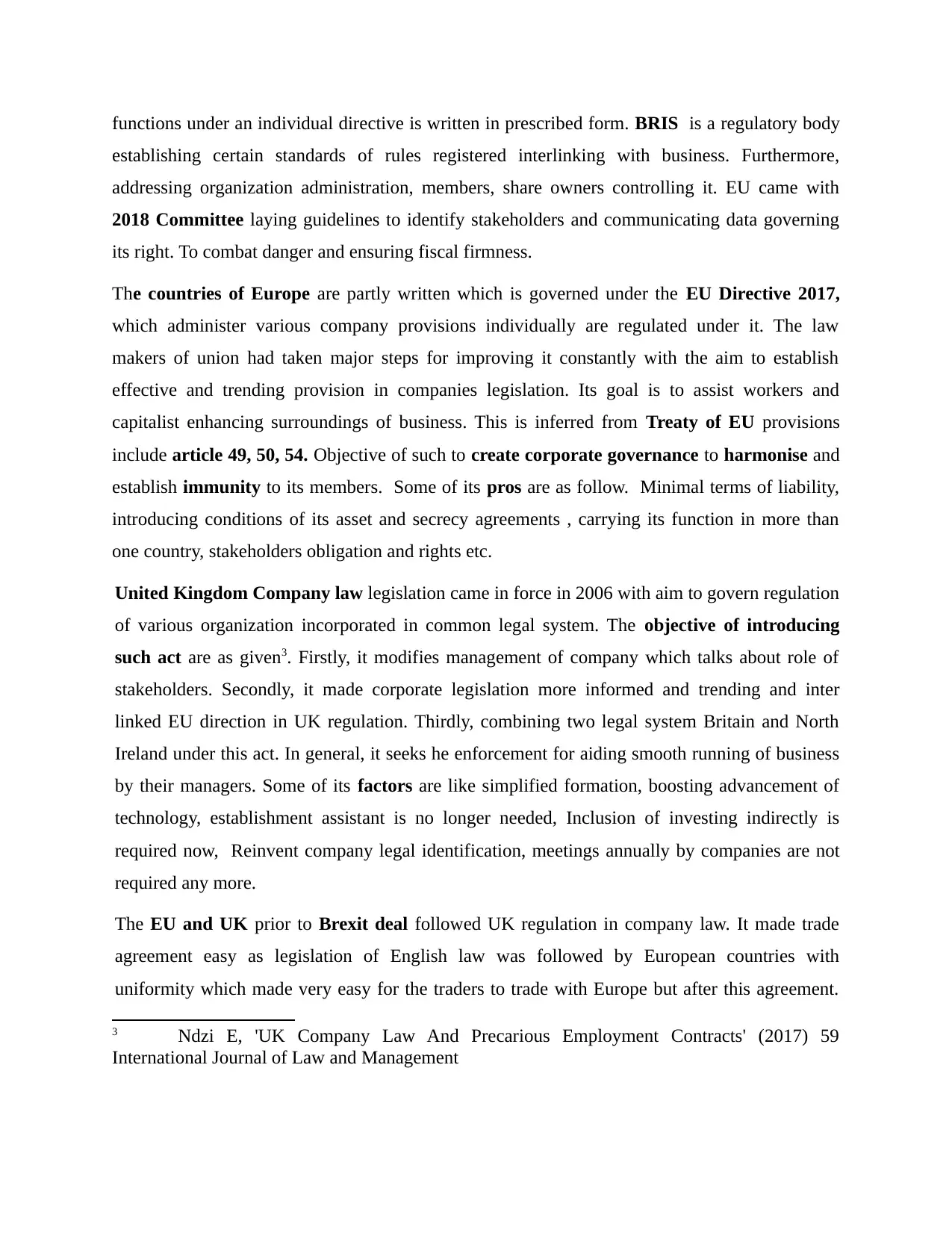
functions under an individual directive is written in prescribed form. BRIS is a regulatory body
establishing certain standards of rules registered interlinking with business. Furthermore,
addressing organization administration, members, share owners controlling it. EU came with
2018 Committee laying guidelines to identify stakeholders and communicating data governing
its right. To combat danger and ensuring fiscal firmness.
The countries of Europe are partly written which is governed under the EU Directive 2017,
which administer various company provisions individually are regulated under it. The law
makers of union had taken major steps for improving it constantly with the aim to establish
effective and trending provision in companies legislation. Its goal is to assist workers and
capitalist enhancing surroundings of business. This is inferred from Treaty of EU provisions
include article 49, 50, 54. Objective of such to create corporate governance to harmonise and
establish immunity to its members. Some of its pros are as follow. Minimal terms of liability,
introducing conditions of its asset and secrecy agreements , carrying its function in more than
one country, stakeholders obligation and rights etc.
United Kingdom Company law legislation came in force in 2006 with aim to govern regulation
of various organization incorporated in common legal system. The objective of introducing
such act are as given3. Firstly, it modifies management of company which talks about role of
stakeholders. Secondly, it made corporate legislation more informed and trending and inter
linked EU direction in UK regulation. Thirdly, combining two legal system Britain and North
Ireland under this act. In general, it seeks he enforcement for aiding smooth running of business
by their managers. Some of its factors are like simplified formation, boosting advancement of
technology, establishment assistant is no longer needed, Inclusion of investing indirectly is
required now, Reinvent company legal identification, meetings annually by companies are not
required any more.
The EU and UK prior to Brexit deal followed UK regulation in company law. It made trade
agreement easy as legislation of English law was followed by European countries with
uniformity which made very easy for the traders to trade with Europe but after this agreement.
3 Ndzi E, 'UK Company Law And Precarious Employment Contracts' (2017) 59
International Journal of Law and Management
establishing certain standards of rules registered interlinking with business. Furthermore,
addressing organization administration, members, share owners controlling it. EU came with
2018 Committee laying guidelines to identify stakeholders and communicating data governing
its right. To combat danger and ensuring fiscal firmness.
The countries of Europe are partly written which is governed under the EU Directive 2017,
which administer various company provisions individually are regulated under it. The law
makers of union had taken major steps for improving it constantly with the aim to establish
effective and trending provision in companies legislation. Its goal is to assist workers and
capitalist enhancing surroundings of business. This is inferred from Treaty of EU provisions
include article 49, 50, 54. Objective of such to create corporate governance to harmonise and
establish immunity to its members. Some of its pros are as follow. Minimal terms of liability,
introducing conditions of its asset and secrecy agreements , carrying its function in more than
one country, stakeholders obligation and rights etc.
United Kingdom Company law legislation came in force in 2006 with aim to govern regulation
of various organization incorporated in common legal system. The objective of introducing
such act are as given3. Firstly, it modifies management of company which talks about role of
stakeholders. Secondly, it made corporate legislation more informed and trending and inter
linked EU direction in UK regulation. Thirdly, combining two legal system Britain and North
Ireland under this act. In general, it seeks he enforcement for aiding smooth running of business
by their managers. Some of its factors are like simplified formation, boosting advancement of
technology, establishment assistant is no longer needed, Inclusion of investing indirectly is
required now, Reinvent company legal identification, meetings annually by companies are not
required any more.
The EU and UK prior to Brexit deal followed UK regulation in company law. It made trade
agreement easy as legislation of English law was followed by European countries with
uniformity which made very easy for the traders to trade with Europe but after this agreement.
3 Ndzi E, 'UK Company Law And Precarious Employment Contracts' (2017) 59
International Journal of Law and Management
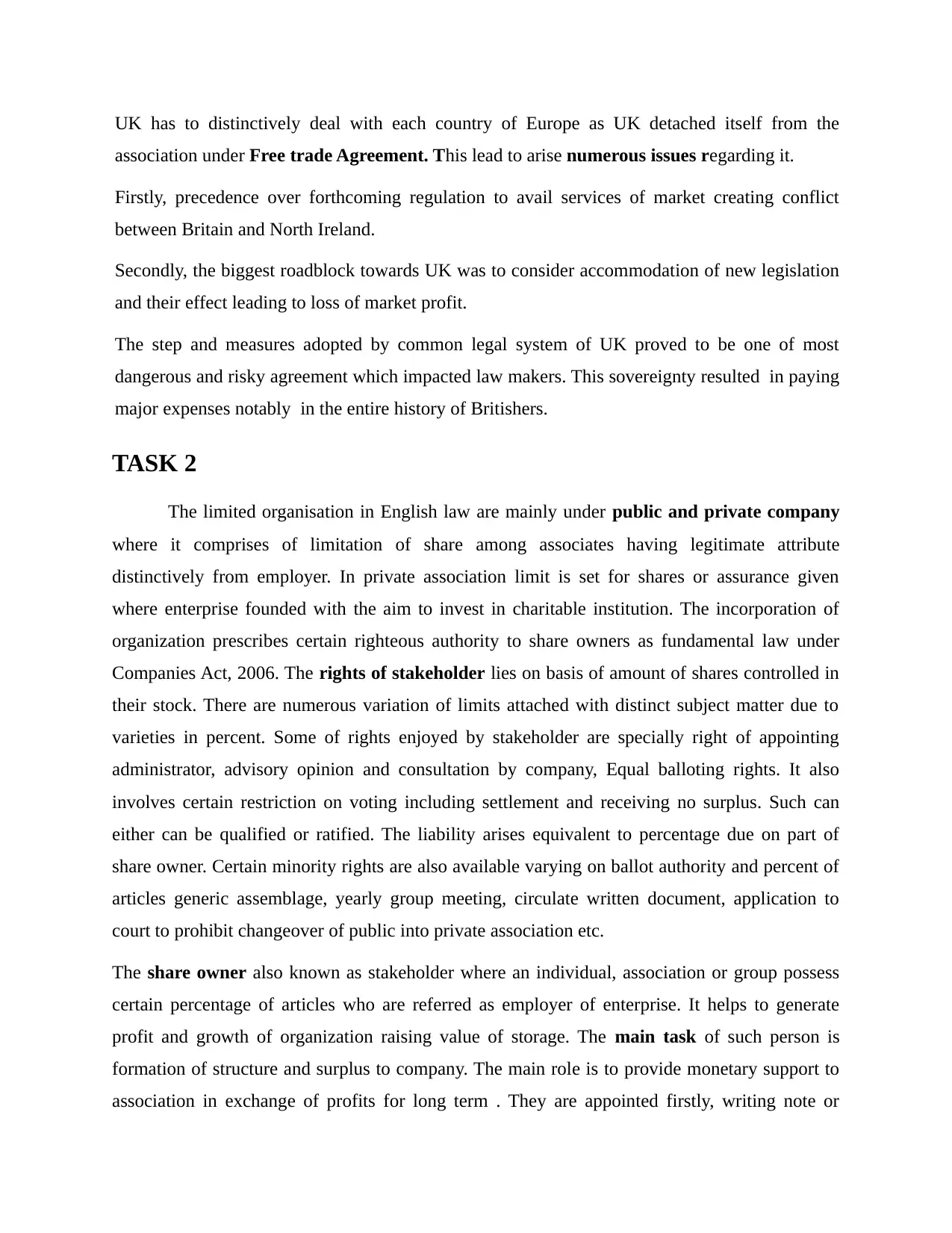
UK has to distinctively deal with each country of Europe as UK detached itself from the
association under Free trade Agreement. This lead to arise numerous issues regarding it.
Firstly, precedence over forthcoming regulation to avail services of market creating conflict
between Britain and North Ireland.
Secondly, the biggest roadblock towards UK was to consider accommodation of new legislation
and their effect leading to loss of market profit.
The step and measures adopted by common legal system of UK proved to be one of most
dangerous and risky agreement which impacted law makers. This sovereignty resulted in paying
major expenses notably in the entire history of Britishers.
TASK 2
The limited organisation in English law are mainly under public and private company
where it comprises of limitation of share among associates having legitimate attribute
distinctively from employer. In private association limit is set for shares or assurance given
where enterprise founded with the aim to invest in charitable institution. The incorporation of
organization prescribes certain righteous authority to share owners as fundamental law under
Companies Act, 2006. The rights of stakeholder lies on basis of amount of shares controlled in
their stock. There are numerous variation of limits attached with distinct subject matter due to
varieties in percent. Some of rights enjoyed by stakeholder are specially right of appointing
administrator, advisory opinion and consultation by company, Equal balloting rights. It also
involves certain restriction on voting including settlement and receiving no surplus. Such can
either can be qualified or ratified. The liability arises equivalent to percentage due on part of
share owner. Certain minority rights are also available varying on ballot authority and percent of
articles generic assemblage, yearly group meeting, circulate written document, application to
court to prohibit changeover of public into private association etc.
The share owner also known as stakeholder where an individual, association or group possess
certain percentage of articles who are referred as employer of enterprise. It helps to generate
profit and growth of organization raising value of storage. The main task of such person is
formation of structure and surplus to company. The main role is to provide monetary support to
association in exchange of profits for long term . They are appointed firstly, writing note or
association under Free trade Agreement. This lead to arise numerous issues regarding it.
Firstly, precedence over forthcoming regulation to avail services of market creating conflict
between Britain and North Ireland.
Secondly, the biggest roadblock towards UK was to consider accommodation of new legislation
and their effect leading to loss of market profit.
The step and measures adopted by common legal system of UK proved to be one of most
dangerous and risky agreement which impacted law makers. This sovereignty resulted in paying
major expenses notably in the entire history of Britishers.
TASK 2
The limited organisation in English law are mainly under public and private company
where it comprises of limitation of share among associates having legitimate attribute
distinctively from employer. In private association limit is set for shares or assurance given
where enterprise founded with the aim to invest in charitable institution. The incorporation of
organization prescribes certain righteous authority to share owners as fundamental law under
Companies Act, 2006. The rights of stakeholder lies on basis of amount of shares controlled in
their stock. There are numerous variation of limits attached with distinct subject matter due to
varieties in percent. Some of rights enjoyed by stakeholder are specially right of appointing
administrator, advisory opinion and consultation by company, Equal balloting rights. It also
involves certain restriction on voting including settlement and receiving no surplus. Such can
either can be qualified or ratified. The liability arises equivalent to percentage due on part of
share owner. Certain minority rights are also available varying on ballot authority and percent of
articles generic assemblage, yearly group meeting, circulate written document, application to
court to prohibit changeover of public into private association etc.
The share owner also known as stakeholder where an individual, association or group possess
certain percentage of articles who are referred as employer of enterprise. It helps to generate
profit and growth of organization raising value of storage. The main task of such person is
formation of structure and surplus to company. The main role is to provide monetary support to
association in exchange of profits for long term . They are appointed firstly, writing note or
⊘ This is a preview!⊘
Do you want full access?
Subscribe today to unlock all pages.

Trusted by 1+ million students worldwide
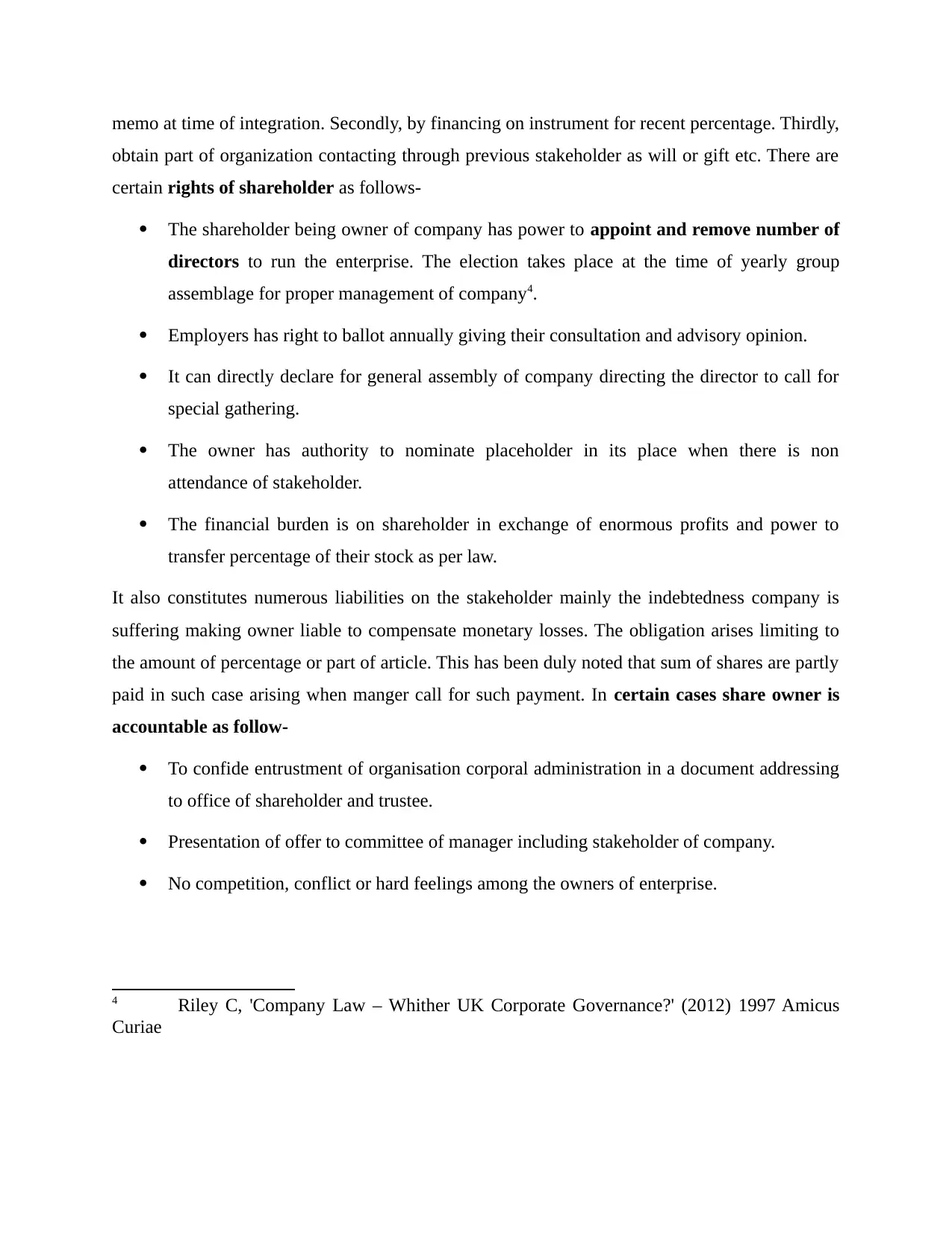
memo at time of integration. Secondly, by financing on instrument for recent percentage. Thirdly,
obtain part of organization contacting through previous stakeholder as will or gift etc. There are
certain rights of shareholder as follows-
The shareholder being owner of company has power to appoint and remove number of
directors to run the enterprise. The election takes place at the time of yearly group
assemblage for proper management of company4.
Employers has right to ballot annually giving their consultation and advisory opinion.
It can directly declare for general assembly of company directing the director to call for
special gathering.
The owner has authority to nominate placeholder in its place when there is non
attendance of stakeholder.
The financial burden is on shareholder in exchange of enormous profits and power to
transfer percentage of their stock as per law.
It also constitutes numerous liabilities on the stakeholder mainly the indebtedness company is
suffering making owner liable to compensate monetary losses. The obligation arises limiting to
the amount of percentage or part of article. This has been duly noted that sum of shares are partly
paid in such case arising when manger call for such payment. In certain cases share owner is
accountable as follow-
To confide entrustment of organisation corporal administration in a document addressing
to office of shareholder and trustee.
Presentation of offer to committee of manager including stakeholder of company.
No competition, conflict or hard feelings among the owners of enterprise.
4 Riley C, 'Company Law – Whither UK Corporate Governance?' (2012) 1997 Amicus
Curiae
obtain part of organization contacting through previous stakeholder as will or gift etc. There are
certain rights of shareholder as follows-
The shareholder being owner of company has power to appoint and remove number of
directors to run the enterprise. The election takes place at the time of yearly group
assemblage for proper management of company4.
Employers has right to ballot annually giving their consultation and advisory opinion.
It can directly declare for general assembly of company directing the director to call for
special gathering.
The owner has authority to nominate placeholder in its place when there is non
attendance of stakeholder.
The financial burden is on shareholder in exchange of enormous profits and power to
transfer percentage of their stock as per law.
It also constitutes numerous liabilities on the stakeholder mainly the indebtedness company is
suffering making owner liable to compensate monetary losses. The obligation arises limiting to
the amount of percentage or part of article. This has been duly noted that sum of shares are partly
paid in such case arising when manger call for such payment. In certain cases share owner is
accountable as follow-
To confide entrustment of organisation corporal administration in a document addressing
to office of shareholder and trustee.
Presentation of offer to committee of manager including stakeholder of company.
No competition, conflict or hard feelings among the owners of enterprise.
4 Riley C, 'Company Law – Whither UK Corporate Governance?' (2012) 1997 Amicus
Curiae
Paraphrase This Document
Need a fresh take? Get an instant paraphrase of this document with our AI Paraphraser
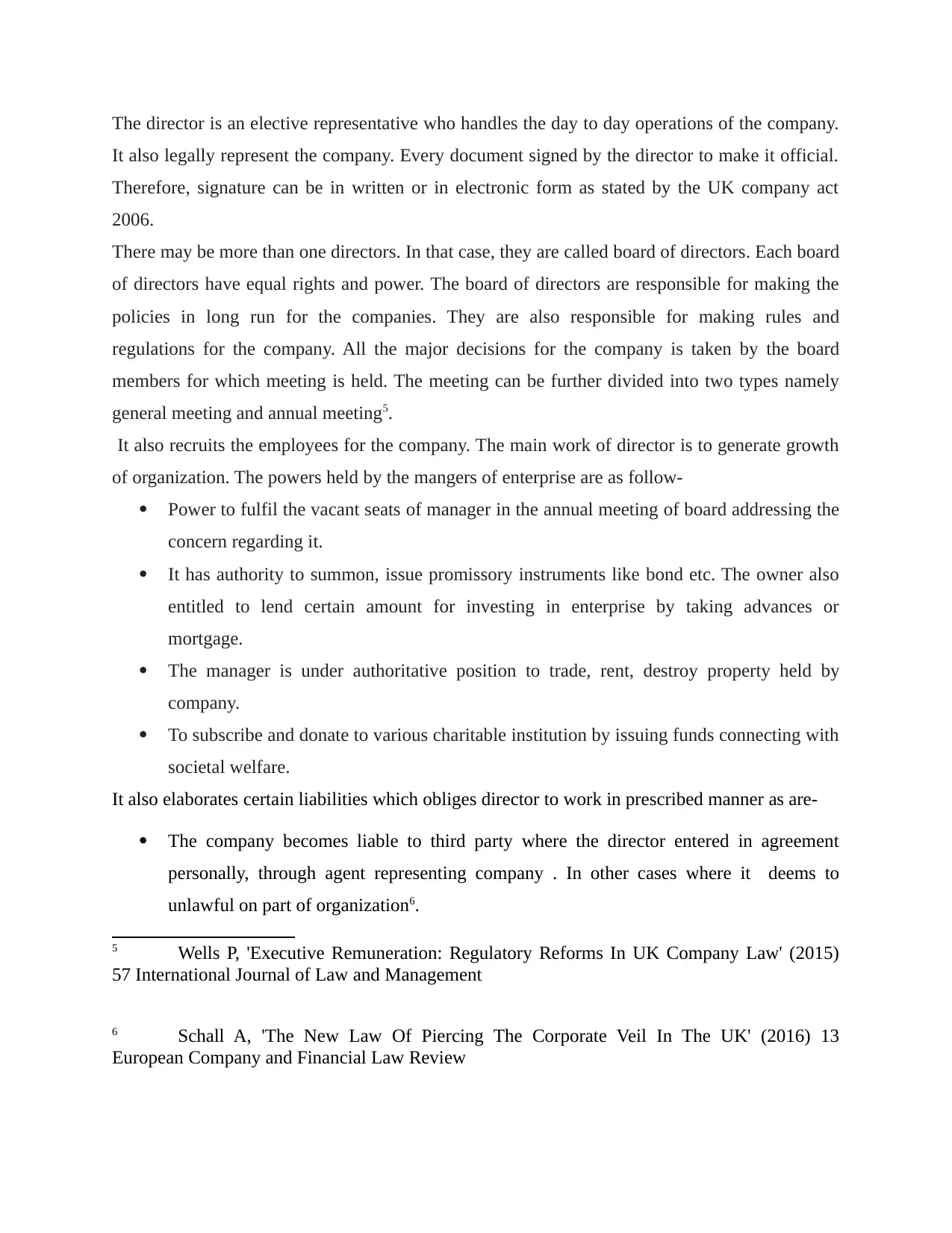
The director is an elective representative who handles the day to day operations of the company.
It also legally represent the company. Every document signed by the director to make it official.
Therefore, signature can be in written or in electronic form as stated by the UK company act
2006.
There may be more than one directors. In that case, they are called board of directors. Each board
of directors have equal rights and power. The board of directors are responsible for making the
policies in long run for the companies. They are also responsible for making rules and
regulations for the company. All the major decisions for the company is taken by the board
members for which meeting is held. The meeting can be further divided into two types namely
general meeting and annual meeting5.
It also recruits the employees for the company. The main work of director is to generate growth
of organization. The powers held by the mangers of enterprise are as follow-
Power to fulfil the vacant seats of manager in the annual meeting of board addressing the
concern regarding it.
It has authority to summon, issue promissory instruments like bond etc. The owner also
entitled to lend certain amount for investing in enterprise by taking advances or
mortgage.
The manager is under authoritative position to trade, rent, destroy property held by
company.
To subscribe and donate to various charitable institution by issuing funds connecting with
societal welfare.
It also elaborates certain liabilities which obliges director to work in prescribed manner as are-
The company becomes liable to third party where the director entered in agreement
personally, through agent representing company . In other cases where it deems to
unlawful on part of organization6.
5 Wells P, 'Executive Remuneration: Regulatory Reforms In UK Company Law' (2015)
57 International Journal of Law and Management
6 Schall A, 'The New Law Of Piercing The Corporate Veil In The UK' (2016) 13
European Company and Financial Law Review
It also legally represent the company. Every document signed by the director to make it official.
Therefore, signature can be in written or in electronic form as stated by the UK company act
2006.
There may be more than one directors. In that case, they are called board of directors. Each board
of directors have equal rights and power. The board of directors are responsible for making the
policies in long run for the companies. They are also responsible for making rules and
regulations for the company. All the major decisions for the company is taken by the board
members for which meeting is held. The meeting can be further divided into two types namely
general meeting and annual meeting5.
It also recruits the employees for the company. The main work of director is to generate growth
of organization. The powers held by the mangers of enterprise are as follow-
Power to fulfil the vacant seats of manager in the annual meeting of board addressing the
concern regarding it.
It has authority to summon, issue promissory instruments like bond etc. The owner also
entitled to lend certain amount for investing in enterprise by taking advances or
mortgage.
The manager is under authoritative position to trade, rent, destroy property held by
company.
To subscribe and donate to various charitable institution by issuing funds connecting with
societal welfare.
It also elaborates certain liabilities which obliges director to work in prescribed manner as are-
The company becomes liable to third party where the director entered in agreement
personally, through agent representing company . In other cases where it deems to
unlawful on part of organization6.
5 Wells P, 'Executive Remuneration: Regulatory Reforms In UK Company Law' (2015)
57 International Journal of Law and Management
6 Schall A, 'The New Law Of Piercing The Corporate Veil In The UK' (2016) 13
European Company and Financial Law Review
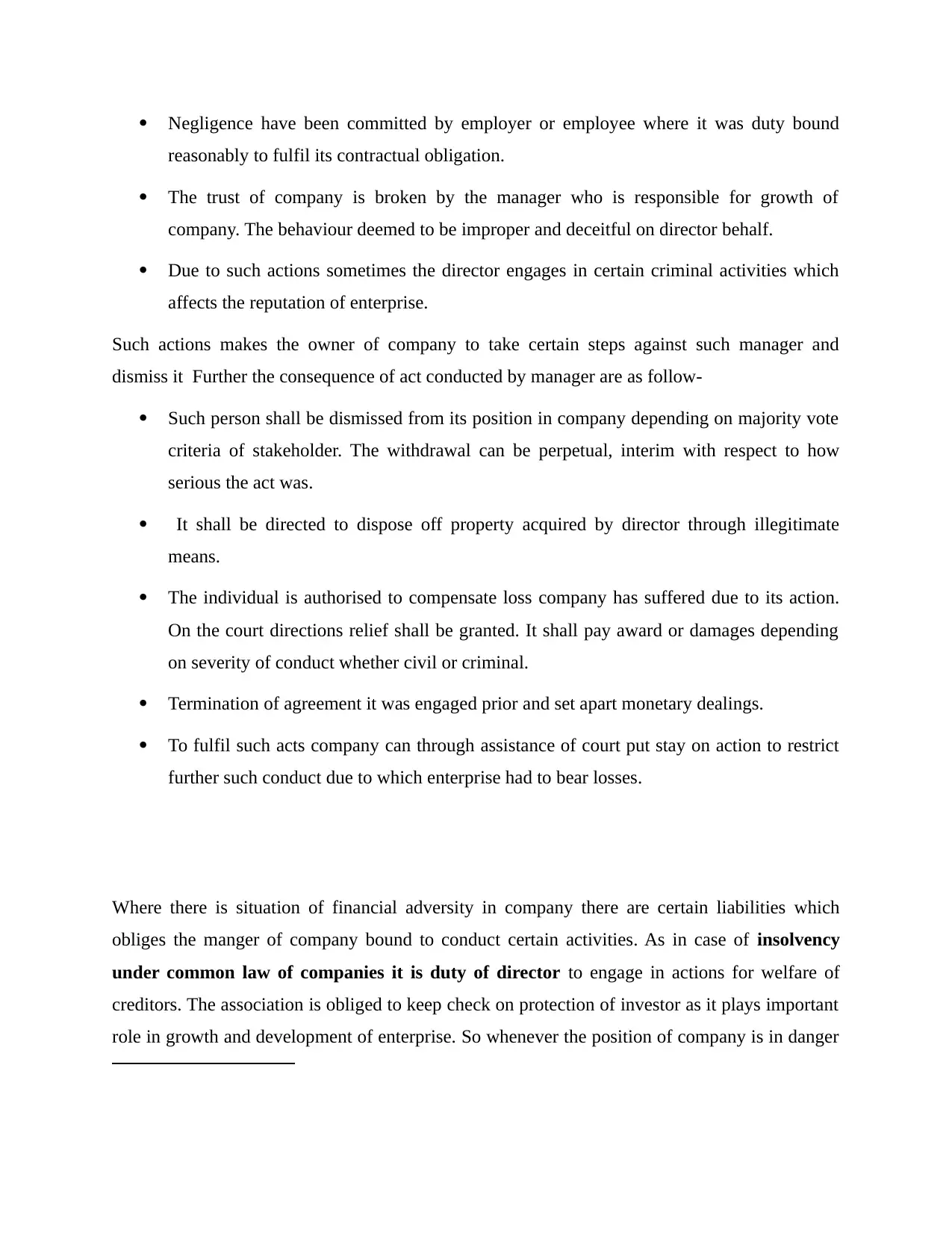
Negligence have been committed by employer or employee where it was duty bound
reasonably to fulfil its contractual obligation.
The trust of company is broken by the manager who is responsible for growth of
company. The behaviour deemed to be improper and deceitful on director behalf.
Due to such actions sometimes the director engages in certain criminal activities which
affects the reputation of enterprise.
Such actions makes the owner of company to take certain steps against such manager and
dismiss it Further the consequence of act conducted by manager are as follow-
Such person shall be dismissed from its position in company depending on majority vote
criteria of stakeholder. The withdrawal can be perpetual, interim with respect to how
serious the act was.
It shall be directed to dispose off property acquired by director through illegitimate
means.
The individual is authorised to compensate loss company has suffered due to its action.
On the court directions relief shall be granted. It shall pay award or damages depending
on severity of conduct whether civil or criminal.
Termination of agreement it was engaged prior and set apart monetary dealings.
To fulfil such acts company can through assistance of court put stay on action to restrict
further such conduct due to which enterprise had to bear losses.
Where there is situation of financial adversity in company there are certain liabilities which
obliges the manger of company bound to conduct certain activities. As in case of insolvency
under common law of companies it is duty of director to engage in actions for welfare of
creditors. The association is obliged to keep check on protection of investor as it plays important
role in growth and development of enterprise. So whenever the position of company is in danger
reasonably to fulfil its contractual obligation.
The trust of company is broken by the manager who is responsible for growth of
company. The behaviour deemed to be improper and deceitful on director behalf.
Due to such actions sometimes the director engages in certain criminal activities which
affects the reputation of enterprise.
Such actions makes the owner of company to take certain steps against such manager and
dismiss it Further the consequence of act conducted by manager are as follow-
Such person shall be dismissed from its position in company depending on majority vote
criteria of stakeholder. The withdrawal can be perpetual, interim with respect to how
serious the act was.
It shall be directed to dispose off property acquired by director through illegitimate
means.
The individual is authorised to compensate loss company has suffered due to its action.
On the court directions relief shall be granted. It shall pay award or damages depending
on severity of conduct whether civil or criminal.
Termination of agreement it was engaged prior and set apart monetary dealings.
To fulfil such acts company can through assistance of court put stay on action to restrict
further such conduct due to which enterprise had to bear losses.
Where there is situation of financial adversity in company there are certain liabilities which
obliges the manger of company bound to conduct certain activities. As in case of insolvency
under common law of companies it is duty of director to engage in actions for welfare of
creditors. The association is obliged to keep check on protection of investor as it plays important
role in growth and development of enterprise. So whenever the position of company is in danger
⊘ This is a preview!⊘
Do you want full access?
Subscribe today to unlock all pages.

Trusted by 1+ million students worldwide
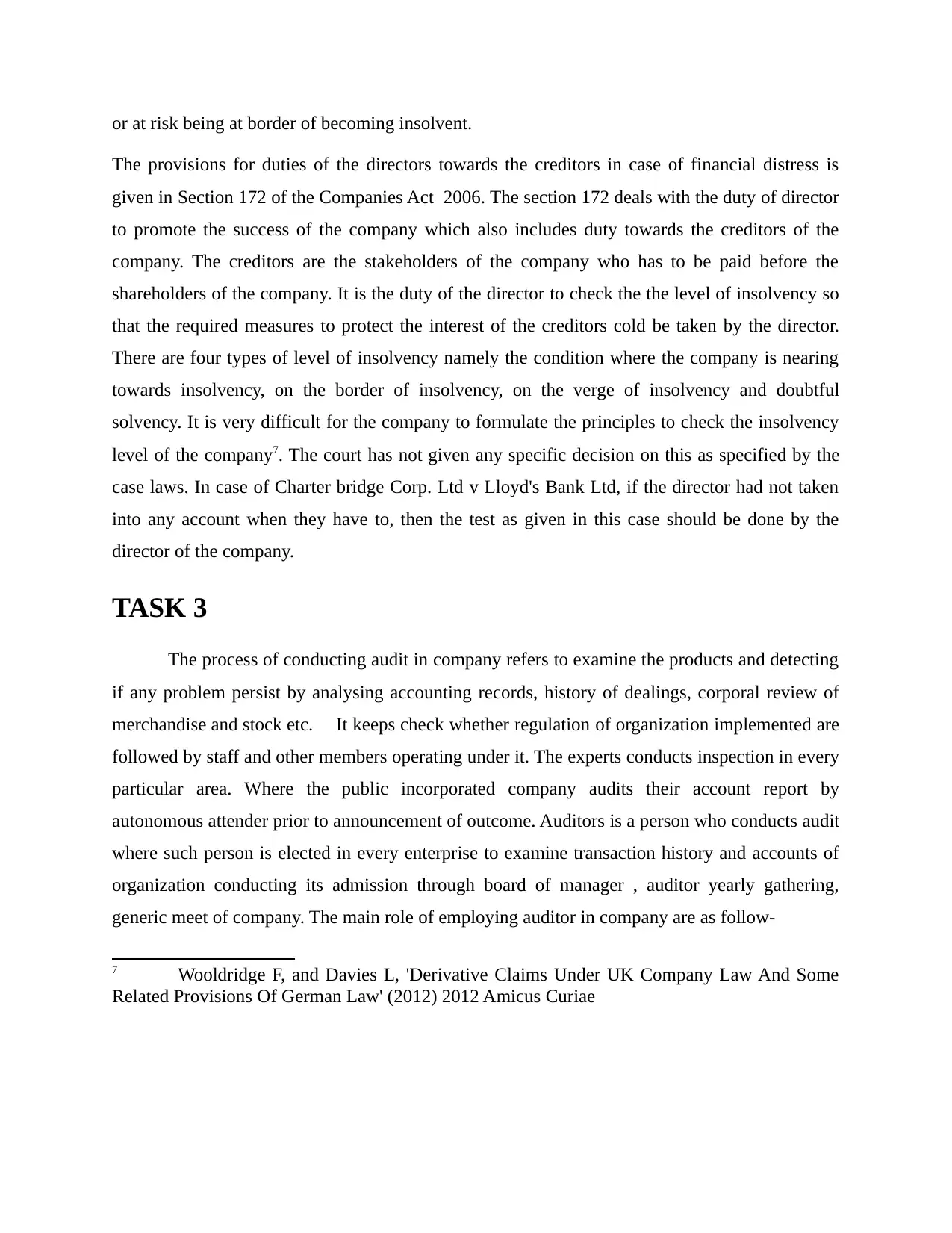
or at risk being at border of becoming insolvent.
The provisions for duties of the directors towards the creditors in case of financial distress is
given in Section 172 of the Companies Act 2006. The section 172 deals with the duty of director
to promote the success of the company which also includes duty towards the creditors of the
company. The creditors are the stakeholders of the company who has to be paid before the
shareholders of the company. It is the duty of the director to check the the level of insolvency so
that the required measures to protect the interest of the creditors cold be taken by the director.
There are four types of level of insolvency namely the condition where the company is nearing
towards insolvency, on the border of insolvency, on the verge of insolvency and doubtful
solvency. It is very difficult for the company to formulate the principles to check the insolvency
level of the company7. The court has not given any specific decision on this as specified by the
case laws. In case of Charter bridge Corp. Ltd v Lloyd's Bank Ltd, if the director had not taken
into any account when they have to, then the test as given in this case should be done by the
director of the company.
TASK 3
The process of conducting audit in company refers to examine the products and detecting
if any problem persist by analysing accounting records, history of dealings, corporal review of
merchandise and stock etc. It keeps check whether regulation of organization implemented are
followed by staff and other members operating under it. The experts conducts inspection in every
particular area. Where the public incorporated company audits their account report by
autonomous attender prior to announcement of outcome. Auditors is a person who conducts audit
where such person is elected in every enterprise to examine transaction history and accounts of
organization conducting its admission through board of manager , auditor yearly gathering,
generic meet of company. The main role of employing auditor in company are as follow-
7 Wooldridge F, and Davies L, 'Derivative Claims Under UK Company Law And Some
Related Provisions Of German Law' (2012) 2012 Amicus Curiae
The provisions for duties of the directors towards the creditors in case of financial distress is
given in Section 172 of the Companies Act 2006. The section 172 deals with the duty of director
to promote the success of the company which also includes duty towards the creditors of the
company. The creditors are the stakeholders of the company who has to be paid before the
shareholders of the company. It is the duty of the director to check the the level of insolvency so
that the required measures to protect the interest of the creditors cold be taken by the director.
There are four types of level of insolvency namely the condition where the company is nearing
towards insolvency, on the border of insolvency, on the verge of insolvency and doubtful
solvency. It is very difficult for the company to formulate the principles to check the insolvency
level of the company7. The court has not given any specific decision on this as specified by the
case laws. In case of Charter bridge Corp. Ltd v Lloyd's Bank Ltd, if the director had not taken
into any account when they have to, then the test as given in this case should be done by the
director of the company.
TASK 3
The process of conducting audit in company refers to examine the products and detecting
if any problem persist by analysing accounting records, history of dealings, corporal review of
merchandise and stock etc. It keeps check whether regulation of organization implemented are
followed by staff and other members operating under it. The experts conducts inspection in every
particular area. Where the public incorporated company audits their account report by
autonomous attender prior to announcement of outcome. Auditors is a person who conducts audit
where such person is elected in every enterprise to examine transaction history and accounts of
organization conducting its admission through board of manager , auditor yearly gathering,
generic meet of company. The main role of employing auditor in company are as follow-
7 Wooldridge F, and Davies L, 'Derivative Claims Under UK Company Law And Some
Related Provisions Of German Law' (2012) 2012 Amicus Curiae
Paraphrase This Document
Need a fresh take? Get an instant paraphrase of this document with our AI Paraphraser
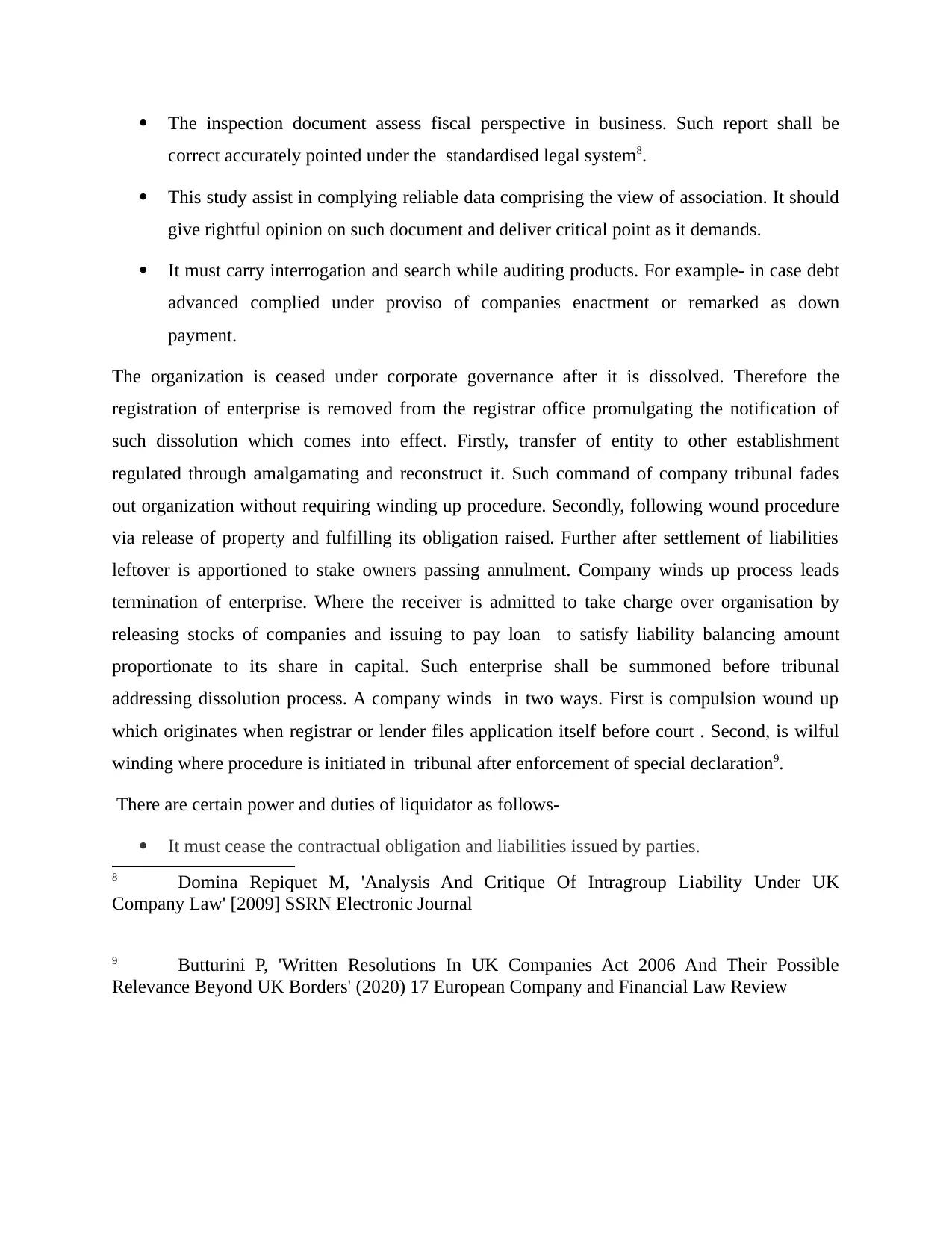
The inspection document assess fiscal perspective in business. Such report shall be
correct accurately pointed under the standardised legal system8.
This study assist in complying reliable data comprising the view of association. It should
give rightful opinion on such document and deliver critical point as it demands.
It must carry interrogation and search while auditing products. For example- in case debt
advanced complied under proviso of companies enactment or remarked as down
payment.
The organization is ceased under corporate governance after it is dissolved. Therefore the
registration of enterprise is removed from the registrar office promulgating the notification of
such dissolution which comes into effect. Firstly, transfer of entity to other establishment
regulated through amalgamating and reconstruct it. Such command of company tribunal fades
out organization without requiring winding up procedure. Secondly, following wound procedure
via release of property and fulfilling its obligation raised. Further after settlement of liabilities
leftover is apportioned to stake owners passing annulment. Company winds up process leads
termination of enterprise. Where the receiver is admitted to take charge over organisation by
releasing stocks of companies and issuing to pay loan to satisfy liability balancing amount
proportionate to its share in capital. Such enterprise shall be summoned before tribunal
addressing dissolution process. A company winds in two ways. First is compulsion wound up
which originates when registrar or lender files application itself before court . Second, is wilful
winding where procedure is initiated in tribunal after enforcement of special declaration9.
There are certain power and duties of liquidator as follows-
It must cease the contractual obligation and liabilities issued by parties.
8 Domina Repiquet M, 'Analysis And Critique Of Intragroup Liability Under UK
Company Law' [2009] SSRN Electronic Journal
9 Butturini P, 'Written Resolutions In UK Companies Act 2006 And Their Possible
Relevance Beyond UK Borders' (2020) 17 European Company and Financial Law Review
correct accurately pointed under the standardised legal system8.
This study assist in complying reliable data comprising the view of association. It should
give rightful opinion on such document and deliver critical point as it demands.
It must carry interrogation and search while auditing products. For example- in case debt
advanced complied under proviso of companies enactment or remarked as down
payment.
The organization is ceased under corporate governance after it is dissolved. Therefore the
registration of enterprise is removed from the registrar office promulgating the notification of
such dissolution which comes into effect. Firstly, transfer of entity to other establishment
regulated through amalgamating and reconstruct it. Such command of company tribunal fades
out organization without requiring winding up procedure. Secondly, following wound procedure
via release of property and fulfilling its obligation raised. Further after settlement of liabilities
leftover is apportioned to stake owners passing annulment. Company winds up process leads
termination of enterprise. Where the receiver is admitted to take charge over organisation by
releasing stocks of companies and issuing to pay loan to satisfy liability balancing amount
proportionate to its share in capital. Such enterprise shall be summoned before tribunal
addressing dissolution process. A company winds in two ways. First is compulsion wound up
which originates when registrar or lender files application itself before court . Second, is wilful
winding where procedure is initiated in tribunal after enforcement of special declaration9.
There are certain power and duties of liquidator as follows-
It must cease the contractual obligation and liabilities issued by parties.
8 Domina Repiquet M, 'Analysis And Critique Of Intragroup Liability Under UK
Company Law' [2009] SSRN Electronic Journal
9 Butturini P, 'Written Resolutions In UK Companies Act 2006 And Their Possible
Relevance Beyond UK Borders' (2020) 17 European Company and Financial Law Review
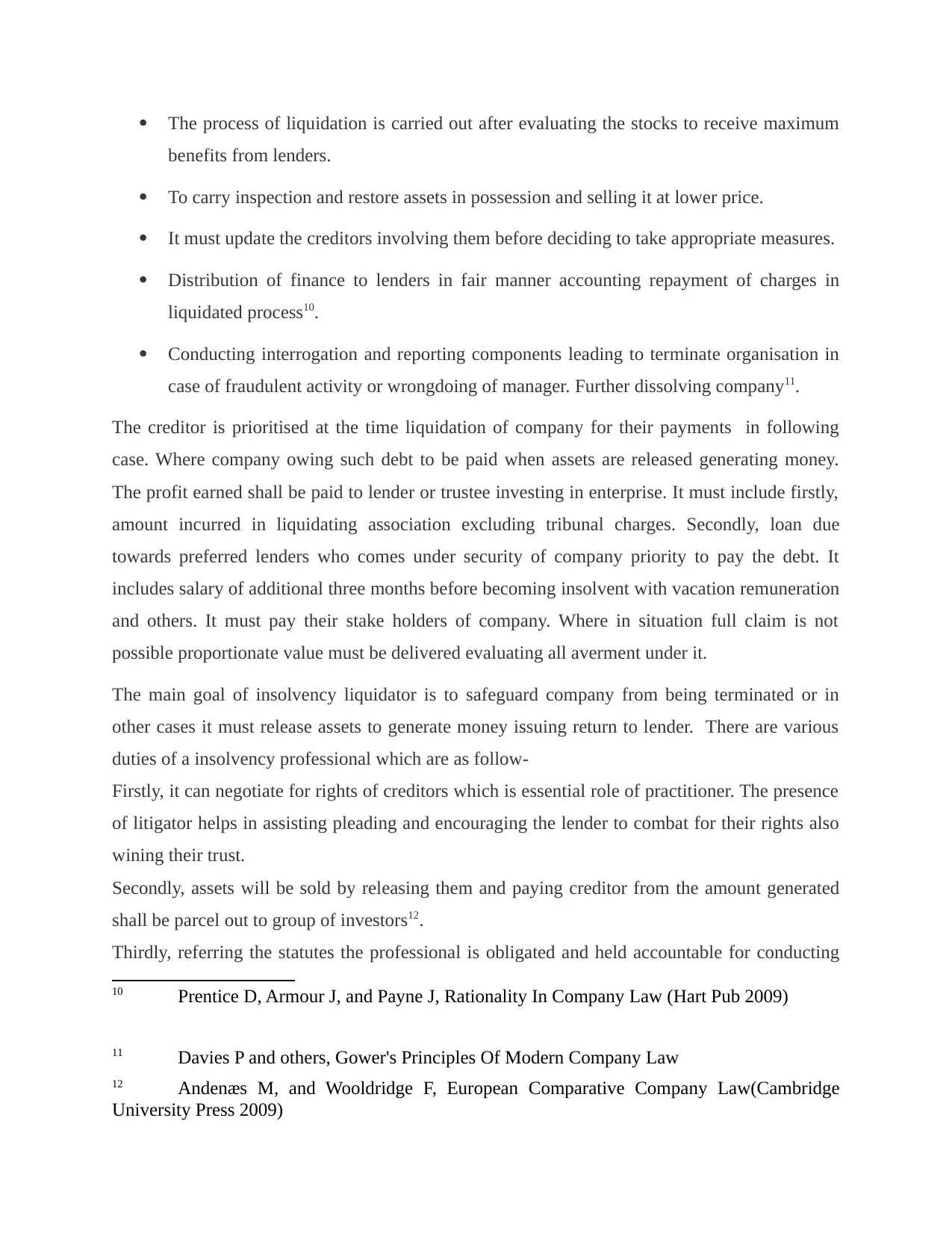
The process of liquidation is carried out after evaluating the stocks to receive maximum
benefits from lenders.
To carry inspection and restore assets in possession and selling it at lower price.
It must update the creditors involving them before deciding to take appropriate measures.
Distribution of finance to lenders in fair manner accounting repayment of charges in
liquidated process10.
Conducting interrogation and reporting components leading to terminate organisation in
case of fraudulent activity or wrongdoing of manager. Further dissolving company11.
The creditor is prioritised at the time liquidation of company for their payments in following
case. Where company owing such debt to be paid when assets are released generating money.
The profit earned shall be paid to lender or trustee investing in enterprise. It must include firstly,
amount incurred in liquidating association excluding tribunal charges. Secondly, loan due
towards preferred lenders who comes under security of company priority to pay the debt. It
includes salary of additional three months before becoming insolvent with vacation remuneration
and others. It must pay their stake holders of company. Where in situation full claim is not
possible proportionate value must be delivered evaluating all averment under it.
The main goal of insolvency liquidator is to safeguard company from being terminated or in
other cases it must release assets to generate money issuing return to lender. There are various
duties of a insolvency professional which are as follow-
Firstly, it can negotiate for rights of creditors which is essential role of practitioner. The presence
of litigator helps in assisting pleading and encouraging the lender to combat for their rights also
wining their trust.
Secondly, assets will be sold by releasing them and paying creditor from the amount generated
shall be parcel out to group of investors12.
Thirdly, referring the statutes the professional is obligated and held accountable for conducting
10 Prentice D, Armour J, and Payne J, Rationality In Company Law (Hart Pub 2009)
11 Davies P and others, Gower's Principles Of Modern Company Law
12 Andenæs M, and Wooldridge F, European Comparative Company Law(Cambridge
University Press 2009)
benefits from lenders.
To carry inspection and restore assets in possession and selling it at lower price.
It must update the creditors involving them before deciding to take appropriate measures.
Distribution of finance to lenders in fair manner accounting repayment of charges in
liquidated process10.
Conducting interrogation and reporting components leading to terminate organisation in
case of fraudulent activity or wrongdoing of manager. Further dissolving company11.
The creditor is prioritised at the time liquidation of company for their payments in following
case. Where company owing such debt to be paid when assets are released generating money.
The profit earned shall be paid to lender or trustee investing in enterprise. It must include firstly,
amount incurred in liquidating association excluding tribunal charges. Secondly, loan due
towards preferred lenders who comes under security of company priority to pay the debt. It
includes salary of additional three months before becoming insolvent with vacation remuneration
and others. It must pay their stake holders of company. Where in situation full claim is not
possible proportionate value must be delivered evaluating all averment under it.
The main goal of insolvency liquidator is to safeguard company from being terminated or in
other cases it must release assets to generate money issuing return to lender. There are various
duties of a insolvency professional which are as follow-
Firstly, it can negotiate for rights of creditors which is essential role of practitioner. The presence
of litigator helps in assisting pleading and encouraging the lender to combat for their rights also
wining their trust.
Secondly, assets will be sold by releasing them and paying creditor from the amount generated
shall be parcel out to group of investors12.
Thirdly, referring the statutes the professional is obligated and held accountable for conducting
10 Prentice D, Armour J, and Payne J, Rationality In Company Law (Hart Pub 2009)
11 Davies P and others, Gower's Principles Of Modern Company Law
12 Andenæs M, and Wooldridge F, European Comparative Company Law(Cambridge
University Press 2009)
⊘ This is a preview!⊘
Do you want full access?
Subscribe today to unlock all pages.

Trusted by 1+ million students worldwide
1 out of 15
Related Documents
Your All-in-One AI-Powered Toolkit for Academic Success.
+13062052269
info@desklib.com
Available 24*7 on WhatsApp / Email
![[object Object]](/_next/static/media/star-bottom.7253800d.svg)
Unlock your academic potential
Copyright © 2020–2025 A2Z Services. All Rights Reserved. Developed and managed by ZUCOL.





